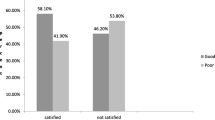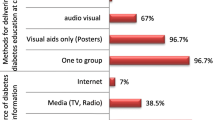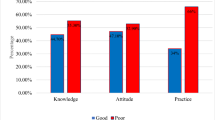Abstract
Introduction
Diabetes mellitus is a global public health emergency in the twenty-first century. Diabetes patients who had to adhere to good self-care recommendation can prevent the complication associated with diabetes mellitus. Self-care management of diabetes mellitus in Sub-Saharan Africa was poor including Ethiopia. The aim of this study was to assess factors influencing diabetes self-care practice among type 2 diabetes patients at Debre Tabor General Hospital, Northwest Ethiopia diabetes clinic follow up unit.
Methods
An institutional based cross-sectional survey was conducted on systematically sampled 405 type 2 diabetes patients at Debre Tabor General Hospital diabetes clinic from June 02/2018 to June 30/2018. Bivariate and multivariable logistic regression was fitted to identify independent predictors of diabetes self-care practice. A p value of less than 0.05 was used to declare statistical significance.
Results
A total of 385 type 2 diabetes patients participated with a response rate of 95%, of which 243 (63.1%) study participants had good self-care practice. The mean ± SD age of the respondents and the duration of diagnosed for diabetes mellitus was 52.28 ± 12.45 and 5.09 ± 3.80 years respectively. Type 2 diabetes patients who had a glucometer at home (AOR = 7.82 CI (3.24, 18.87)), getting a diabetes education (AOR = 2.65 CI (1.44, 4.89)), and having social support (AOR = 2.72 CI (1.66, 4.47)) were statistically associated with good self-care practice.
Conclusion
Despite, the importance of diabetes self-care practice for the management of diabetes and preventing its complications, a significant number of type 2 diabetes patients had poor diabetes self-care practice. So, to enhance this poor practice of diabetes self-care, provision of diabetes self-care education and counseling on self-monitoring blood glucose should be promote by health care providers during their follow up.
Similar content being viewed by others
Data availability
We, all the authors do have the data of this study and we can provide as per the request.
References
IDF diabetes atlas: Seventh edition. International Diabetes Federation. 2015;144. http://www.diabetesatlas.org
International Diabetes Federation (IDF). Eighth edition 2017. IDF Diabetes Atlas, 8th edition. 2017;1–150
Peer N, Kengne AP, Motala AA, Mbanya JC. Diabetes in the Africa region: an update. Diabetes Res Clin Pract. 2014;103(2):197–205.
Assah F, Mbanya JC. Diabetes in sub-saharan Africa. Diabetes Mellit Dev Ctries Underserved Commun. 2016;375(9733):33–48.
Association AD. Standards of medical care in diabetes - 2013. Diabetes Care. 2013;36(SUPPL.1).
Stephani V, Opoku D, Beran D. Self-management of diabetes in sub-Saharan Africa: a systematic review. BMC Public Health. 2018;18:1148.
Ayub M, Ayub S, Masood F, Afzal A, Shafique M, Ullain N. Diabetes & metabolism evaluation of predisposing and Comorbodities associated with diabetes. Diabetes Metab. 2015;6(8):10–2.
Mariam TG, Alemayehu A, Tesfaye E, Mequannt W, Temesgen K, Yetwale F, et al. Prevalence of diabetic foot ulcer and associated factors among adult diabetic patients who attend the diabetic follow-up clinic at the University of Gondar referral hospital, north West Ethiopia, 2016: institutional-based cross-sectional study. J Diabetes Res. 2017;2017(11):4219–29.
Kassahun T, Gesesew H, Mwanri L, Eshetie T. Diabetes related knowledge, self-care behaviours and adherence to medications among diabetic patients in Southwest Ethiopia: a cross-sectional survey. BMC Endocr Disord. 2016;16(1):28.
Asegid A. Assessment of self care practice among adult diabetic patients in Nigist Elleni Mohamed memorial hospital Hossana. J Med Heal Res. 2017;2(1):26–35.
Mamo M, Demissie M. Self care practice and its associated factors among diabetic patients in Addis Ababa public hospitals , cross sectional study. J Diabetes Cholest Metab. 2016;1(Dcm):1–5.
Soediono B. American Association of Diabetes Educators (AADE) position statement. J Chem Inf Model. 1989;53(December):160.
Hill-Briggs F, Gemmell L. Problem solving in diabetes self-management and control. Diabetes Educ. 2007;33(6):1032–50.
Fisher EB, Thorpe CT, McEvoy DeVellis B, DeVellis RF. Healthy coping, negative emotions, and diabetes management. Diabetes Educ. 2007;33(6):1080–103.
Chen L, Magliano DJ, Zimmet PZ. The worldwide epidemiology of type 2 diabetes mellitus—present and future perspectives. Nat Rev Endocrinol. 2011;8(4):228–36.
Istek N, Karakurt P. Effect of activities of daily living on self-Care Agency in Individuals with type 2 diabetes. J Diabetes Mellit. 2016;06(04):247–62.
Weeks CE. Factors influencing self care behaviors of African Americans adults with type 2 diabetes. 2011;1–40.
Mogre V, Abanga ZO, Tzelepis F, Johnson NA, Paul C. Adherence to and factors associated with self-care behaviours in type 2 diabetes patients in Ghana. BMC Endocr Disord. 2017;17(1):1–8.
Toljamo M, Hentinen M. Adherence to self-care and glycaemic control among people with insulin-dependent diabetes mellitus. J Adv Nurs. 2001;34(6):780–6.
Pocius S, Miley K, Rockwood J. Accuracy and timeliness of RN vs. MD radiological interpretation of PICC tips. JAVA - J Assoc Vasc Access. 2009;14(3):143–6.
American Diabetes Association (ADA). Standard of medical care in diabetes - 2017. Diabetes Care. 2017;40(sup 1):s4–s128.
Toobert DJ, Hampson SE, Glasgow RE. The summary of diabetes self-care activities measure. Diabetes Care J. 2000;23(7):943–50.
Fitzgerald JT, Funnell MM, Anderson RM, Nwankwo R, Stansfield RB, Piatt GA. Validation of the revised brief diabetes knowledge test (DKT2). Diabetes Educ. 2016;42(2):178–87.
Mariye T, Tasew H, Teklay G, Gerensea H, Daba W. Magnitude of diabetes self-care practice and associated factors among type two adult diabetic patients following at public hospitals in central zone, Tigray region, Ethiopia, 2017. BMC Res Notes 2018;11(1):1–6, 380.
Yigazu DM, Desse TA. Glycemic control and associated factors among type 2 diabetic patients at Shanan gibe hospital, Southwest Ethiopia. BMC Res Notes. 2017;10(1):1–6.
Tabish SA. Is diabetes becoming the biggest epidemic of the twenty-first century? Int J Health Sci (Qassim). 2007;1(2):V–VIII.
Pastakia SD, Pekny CR, Manyara SM, Fischer L. Diabetes in sub-Saharan Africa - from policy to practice to progress: targeting the existing gaps for future care for diabetes. Diabetes Metab Syndr Obes: Targets Ther. 2017;10:247–63.
Shrivastava SR, Shrivastava PS, Ramasamy J. Role of self-care in management of diabetes mellitus. J Diabetes Metab Disord. 2013;12(1):1.
England TN, Prevention D, Group DPPR. Reduction in the incidence of type 2 diabetes with lifestyle intervention or metformin. Engl J. 2002;346(6):393–403.
Raithatha SJ, Shankar SU, Dinesh K. Self-care practices among diabetic patients in Anand District of Gujarat. ISRN Fam Med. 2014;2014(December 2009):1–6.
Basu S, Garg S, Sharma N, Singh MM, Garg S. Adherence to self-care practices, glycemic status and influencing factors in diabetes patients in a tertiary care hospital in Delhi. World J Diabetes. 2018;9(5):72–9.
Basu S, Khobragade M, Kumar A, Raut DK. Medical adherence and its predictors in diabetes mellitus patients attending government hospitals in the Indian capital, Delhi, 2013: a cross sectional study. Int J Diabetes Dev Ctries. 2015;35:95–101.
Amente T, Teferea B, Endalew H, Berhanu N. Self-care practice and its predictors among adults with diabetes mellitus on follow up at Nekemte hospital diabetes clinic, West Ethiopia. World J Med Med Sci. 2014;2(3):1–16.
Abate TW, Tareke M, Tirfie M. Self-care practices and associated factors among diabetes patients attending the outpatient department in Bahir Dar, Northwest Ethiopia. BMC Res Notes. 2018;11(1):800.
Nejaddadgar N, Solhi M, Jegarghosheh S, Abolfathi M, Ashtarian H. Self-care and related factors in patients with type 2 diabetes. Asian J Biomed Pharm Sci. 2017;7(61):6–10.
Endalew Hailu AE. Assessment of diabetic patient perception on diabetic disease and self-care practice in Dilla University Referral Hospital, South Ethiopia. J Metab Syndr. 2014;03(04):4–11.
Shrivastava SB, Shrivastava PS, Ramasamy J. Role of self-care in management of diabetes mellitus. J Diabetes Metab Disord. 2013;12(14):1–5.
Iregbu S, Iregbu FU. A review of self-management of diabetes in Africa. African J Diabetes Med [Internet] 2016;24(2):5–8. Available from: http://search.ebscohost.com/login.aspx?direct=true&db=a9h&AN=120428063&site=ehost-live.
Sonsona JB. Factors influencing diabetes self-Management of Filipino Americans with type 2 diabetes mellitus : a holistic approach. Walden dissertations and doctoral studies collection. 2014.
Acknowledgments
We, authors, express their deep gratitude to all the study participants, data collectors and staff of Debre Tabor General Hospital for their cooperation.
Funding statement
We didn’t receive any fund for this study.
Author information
Authors and Affiliations
Contributions
All stated authors SA, AA, YK, HG, BA, MT, AD, are involved in the study from the inception to design, acquisition of data, analysis and interpretation and drafting of the manuscript. All authors read and approved the final manuscript.
Corresponding author
Ethics declarations
Consent for publication
Not applicable.
Competing interests
We, authors, declare that we had no competing interests.
Additional information
Publisher’s note
Springer Nature remains neutral with regard to jurisdictional claims in published maps and institutional affiliations.
Rights and permissions
About this article
Cite this article
Tiruneh, S.A., Ayele, A.A., Emiru, Y.K. et al. Factors influencing diabetes self-care practice among type 2 diabetes patients attending diabetic care follow up at an Ethiopian General Hospital, 2018. J Diabetes Metab Disord 18, 199–206 (2019). https://doi.org/10.1007/s40200-019-00408-z
Received:
Accepted:
Published:
Issue Date:
DOI: https://doi.org/10.1007/s40200-019-00408-z




